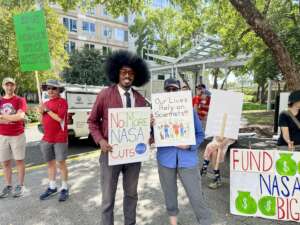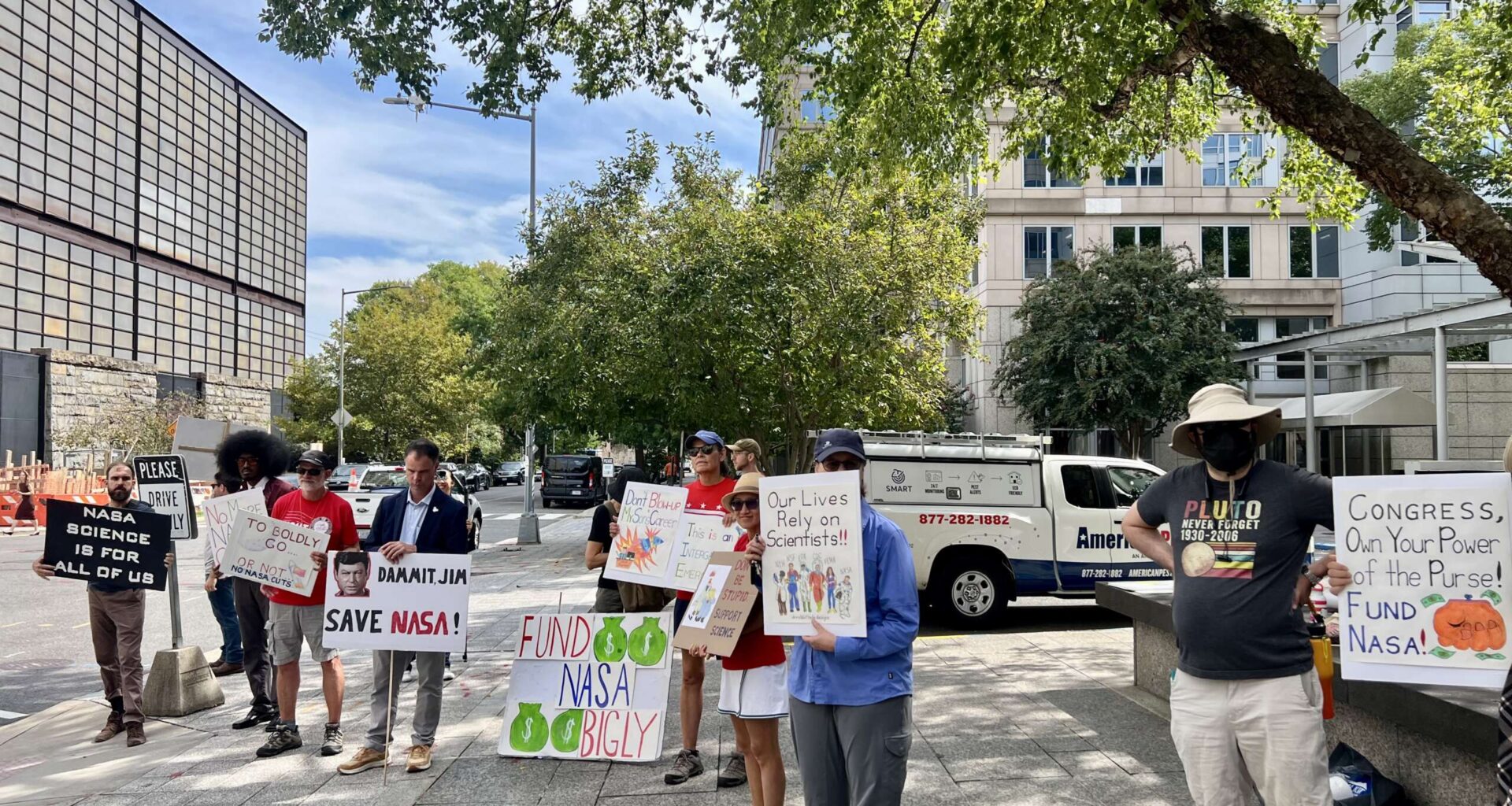NASA Needs Help, a grassroots group made up of NASA employees and supporters, gathered peacefully outside the agency’s headquarters in Washington, D.C., on Monday to protest funding and staffing cuts that threaten to decimate the nation’s premier scientific institution.
Protesters chanted, “When NASA is under attack, what do we do? Rise up, fight back!” as they criticized proposed budget cuts that could slash the agency’s funding by nearly 25% and President Donald Trump’s recent executive order that strips NASA workers of their collective bargaining rights.
“NASA is a tangible product of the greatest expression of the American dream. All of humanity has mused about reaching into the stars, and through decades of unified support by Congress, by presidents and the American public, we’ve done it. Dismantling this American institution is a travesty that no one voted for,” Colette Delawalla, executive director of Stand Up for Science, said at the protest.
“As I stand here today, the White House is tearing apart the ecosystem that has resulted in a flourishing economy, global leadership in tech and science and progress, public health efforts that save millions of lives a year, national security that keeps us safe and a rich and vibrant intellectual community and a system where kids can grow up to want to be an astronaut,” she added.
 Andrew Tennenbaum, a NASA employee, outside of NASA’s headquarters in Washington, D.C. (Photo by Anastasia Obis/Federal News Network)
Andrew Tennenbaum, a NASA employee, outside of NASA’s headquarters in Washington, D.C. (Photo by Anastasia Obis/Federal News Network)
The Trump administration has aggressively pursued funding cuts and personnel layoffs across the country’s scientific and research agencies, and NASA has become one of the biggest casualties. The agency has lost nearly 4,000 employees through the deferred resignation program – about 20% of its workforce. Now, the Trump administration has issued an executive order cancelling collective bargaining rights at multiple federal agencies, including NASA, arguing that the roles those workers perform are tied to national security.
“NASA is not an intelligence agency. NASA is a scientific agency. And NASA workers have been collectively bargaining for decades with no harm to national security. This is just a pretext for expanding Trump’s attack on the labor movement as a whole,” Monica Gorman, area vice president of Goddard Engineers, Scientists and Technicians Association, which represents employees at NASA’s Goddard Space Flight Center in Greenbelt, Maryland, said.
The administration’s move to cancel collective bargaining agreements is the biggest rollback of labor protections NASA employees have ever faced — the executive order impacts thousands of NASA scientists, engineers and technicians and removes union rights that protected half of the agency’s workforce for decades.
Gorman argued stripping worker’s union rights will put NASA’s mission at risk since it would make the agency’s employees less likely to “speak up and bring up inconvenient concerns.” Gorman, who serves as an operations research analyst at NASA, said it’s important for her to be able to provide independent cost estimates for NASA missions without fear of retaliation.
“A huge part of the reason that I have that independence and that my colleagues do is that as a union represented worker, I know that I am protected from unfair retaliation. I can’t get in trouble arbitrarily when I have union rights, and now the Trump administration says I don’t have union rights anymore, and that’s supposed to make us work more efficiently,” Gorman said.
“What we’ve learned from Apollo One, from Challenger and from Columbia, is that these catastrophes don’t happen out of nowhere. People see them coming. People have concerns, and if people don’t feel safe at work, if they don’t have the trust that they can speak up and bring those concerns forward without retaliation, then those concerns get buried,” she added.
 Matthew Biggs, International Federation of Professional & Technical Engineers president. (Photo by Anastasia Obis/Federal News Network)
Matthew Biggs, International Federation of Professional & Technical Engineers president. (Photo by Anastasia Obis/Federal News Network)
NASA’s implementation of the executive order includes terminating collective bargaining agreements with labor unions, stopping NASA’s collection of union dues on behalf of labor unions, and evicting unions from their office space. Matthew Biggs, International Federation of Professional & Technical Engineers president, said NASA will be added to an ongoing lawsuit challenging the termination of collective bargaining rights later this week.
“They’re not going to eliminate us. We are going to survive. We’re going to continue to represent our members. We’re going nowhere,” Biggs said.
]]>
“Why are they doing this? Number one, they want to silence the workforce. They want to silence the workers at NASA. And it’s also a lot easier to do [reduction in force] if there’s no labor unions there to challenge them,” he added.
Fighting continuing resolution
Many of the speakers also called on Congress to pass what they called a “fighting” continuing resolution that includes protections for scientific federal agencies.
The deadline to avoid a government shutdown is fast approaching – lawmakers have until midnight on Sept. 30 to avoid a lapse in government funding. House Republicans already unveiled legislation to keep the government open through Nov. 21, but it is unclear if they have the votes to pass the bill.
Mollie Manier, an employee at National Institutes of Health, said the group wants a stopgap funding bill that does not just “keep the lights on, but includes checks on this administration’s authoritarian overreach and protections for institutions and federal workers.”
 Jayrick Hayes and Ann outside of NASA’s headquarters in Washington, D.C. (Photo by Anastasia Obis/Federal News Network)
Jayrick Hayes and Ann outside of NASA’s headquarters in Washington, D.C. (Photo by Anastasia Obis/Federal News Network)
“We’re urging Congress to insist on a fighting CR for the long-term benefit of this nation and we as federal workers are willing to suffer some short-term pain to get it,” Manier said.
“We do not want a shutdown, but we would rather have a shutdown than the continued dismantling of our institutions and destruction of our public goods that are causing harm to the American people,” she added.
The White House’s proposed budget for NASA is $18.8 billion for fiscal 2026 — a 24% decrease from approximately $24.8 billion in 2025. The proposal targets the agency’s entire satellite program, NASA’s fundamental science research, such as astrophysics, planetary science and heliophysics, among others. Casey Dreier, chief of space policy at The Planetary Society, called the proposal “an extinction-level event.”
Meanwhile, the House and Senate appropriations committee have advanced their versions of the annual spending bill that funds NASA — the House voted to keep NASA’s budget the same as last year, while the Senate bill would give the agency a slight increase in spending.
If you would like to contact this reporter about recent changes in the federal government, please email anastasia.obis@federalnewsnetwork.com or reach out on Signal at (301) 830-2747.
]]>
Copyright
© 2025 Federal News Network. All rights reserved. This website is not intended for users located within the European Economic Area.

